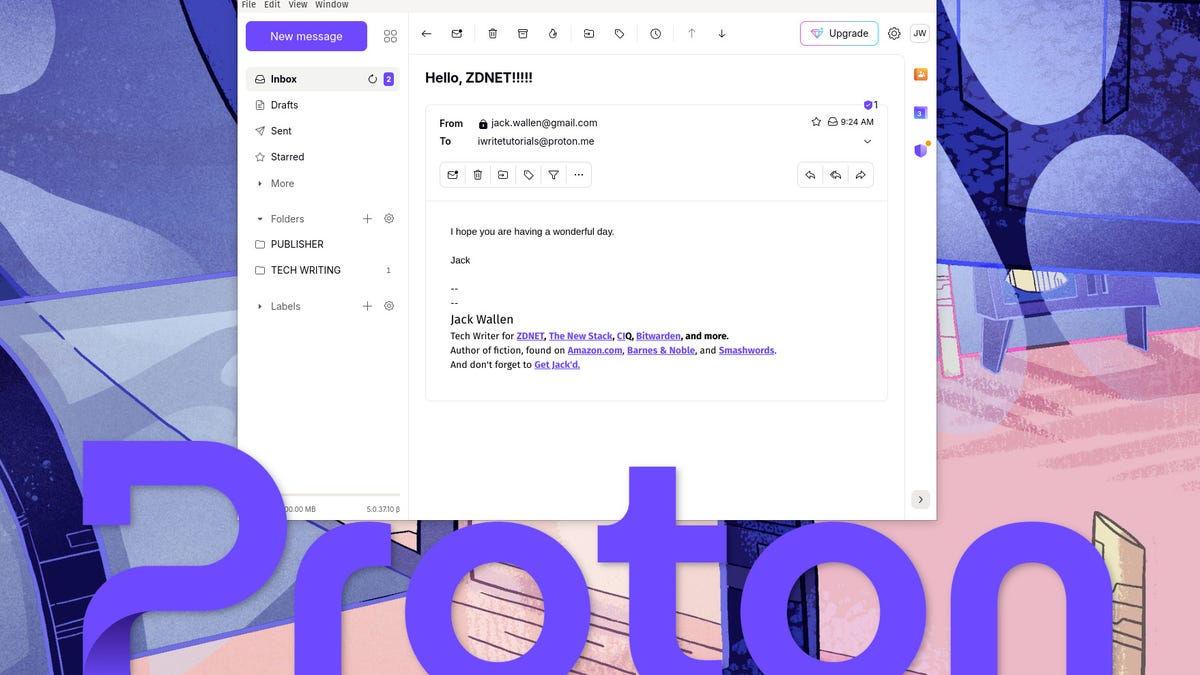ZDNET/Jack WallenZDNET’s key takeawaysThe Proton Mail desktop client is available now for Linux, MacOS, and Windows.With a beautiful UI, all the features you need, and a very shallow learning curve, this email client is an outstanding option for your personal email management.The Proton Mail desktop client requires a paid Proton Mail account (which starts at $3.99/month).
I’ve been hopping from email client to email client on Linux, and ultimately been unhappy with something about each app I’ve tried. And believe me when I tell you that I’ve tried them all: Thunderbird, Evolution, Claws Mail, Geary, KMail, Mutt, Balsa, Pine, Slypheed, and Trojita.
Although some of the above come very close to meeting my needs, each of them have their own unique issues. Don’t get me wrong, I know the perfect email client doesn’t exist. But I want a tool that includes the features I need (and no more) with a UI that’s modern, clean, and can be relied on to deal with multiple accounts and heavy traffic.
Also: The best password managers you can buy
When I found out that Proton Mail had released their desktop client for Linux, you can bet I was eager to give it a try. Understand, I don’t really use my Proton email address (and never really have). I have my own domains that I use for the majority of my email as well as a Google account to fill other needs.
View at Proton
I also knew going into this that to use my IMAP servers, I’d have to install the Proton Bridge, which meant the emails from my domains would be routed through the Proton servers. When the Proton Bridge was first introduced, there was a lot of concern regarding its security. Since then, those concerns have subsided and every report and account I’ve read about the Bridge has been positive.
With that in mind, I installed Proton Mail and decided to kick it around with a new Proton email address (the trial for the desktop client only lasts 5 days) to decide if this will be my new email client.
I was immediately impressed. The UI is very well designed (unlike so many Linux email clients) and easy to use. I also found plenty of settings available (in the “All Settings” sections), including privacy, folders & labels, filters, forward and auto-reply, domain names, and encryption & keys.
The only caveat I’ve found with Proton mail so far is that the use of third-party SMTP services is limited to the Proton For Business plan (which is almost twice the price for the individual plan). That means I won’t be able to use my domain’s SMTP servers. That’s something I can most likely live with.
Also: Windows 12 FAQ: Is it coming in 2024? (Plus some surprising predictions)
Some of the features I like about Proton Mail include:
The modern UI makes navigating email easy and easy on the eyesScheduled sending of emailIntuitive keyboard shortcutsEasy folder and label management (with drag and drop support and notifications)Simple email filtering (with Select All, which is so handy)Built-in logsAuto-forwarding for GmailAnti-phishingAutomatic tracker protectionConversation groupingAuto-delete trash and spam after 30 daysAuto-unsubscribe2FA support
The Proton Mail desktop client does include the Calendar app as well, but I use the Google Calendar and Proton Calendar is one-way, read-only with Google. That’s fine by me because I prefer to have my email and calendar apps separate.
It all boils down to one question: is Proton Mail worth the $3.99/month charge, when there are plenty of free email clients for Linux? At the moment, I’m on the “no” side of that fence, but every time I switch from Proton Mail back to my current default client, Geary, I find I miss the Proton Mail UI.
Also: Want to be a DevOps engineer? Here’s the good, the bad, and the ugly
If I had to guess, I will most likely end up paying to use this desktop app, simply because it checks more boxes than most other Linux email clients. Proton Mail offers just the right balance between feature set and modern design that gives it the edge over most apps of its kind. We’ll see what happens when this trial period ends, but I’m fairly certain of the outcome.
If you’re interested in testing the Proton Mail client on Linux, make sure you first create a Proton Email account and then download either the .deb or .rpm file for your distribution. Once you’ve installed the app, log in with your Proton Mail account credentials and enjoy that fresh new app smell.
